"For deliverance has been too long delayed, and there seems no end to the days of evil"
Those words from the Hanukkah song "Maoz Tzur" reflect but part of the mood here. Glimpses into Israel's mindset from this weekend's papers.
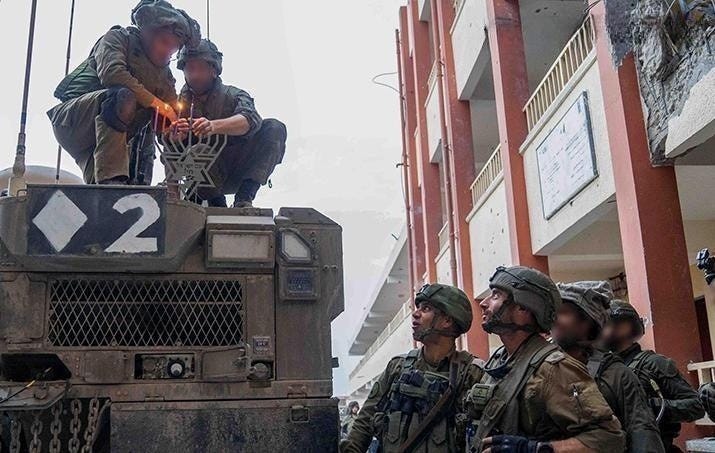
Not surprisingly, much of the focus of the news this weekend was on the war, with a Hanukkah twist. There were stories of “miracles” of those who were saved, “heroes” who did extraordinary things on October 7 and beyond, and even a new stanza to Maoz Tzur about the Gaza War. The photo above, from the IDF Spokesman’s office, is of Israeli troops lighting Hanukkah candles on the third day of Hanukkah, somewhere inside Gaza. Zoom in if you need to.
Today, we focus on a few brief items, only one related to Hanukkah.
Immediately below, a portion of the front page of Yediot Ahronot, with a photograph showing former IDF Chief of Staff Gadi Eizenkot, now serving in the war cabinet which is running the war, with his youngest son, Gal. Gal was killed in combat a few days ago, and the column to the left of the photograph, by Chanoch Daum, is a “letter” to Eizenkot from the people of Israel.
A Makor Rishon cartoon of Hamas head Yihyeh Sinwar watching Israeli TV (which he is known to do, as he speaks a perfectly fluent Hebrew) with pictures of humanitarian assistance trucks bringing fuel into Gaza. We’ll come back to that.
The very last paragraph of Ari Shavit’s Op-Ed in Makor Rishon, just to give a sense of what many wise Israelis believe lies ahead of us.
A translation of Eliaz Cohen’s column in the right of center, religious, Makor Rishon, on the need for peace. Cohen is a well-known peace activist … more on him below.
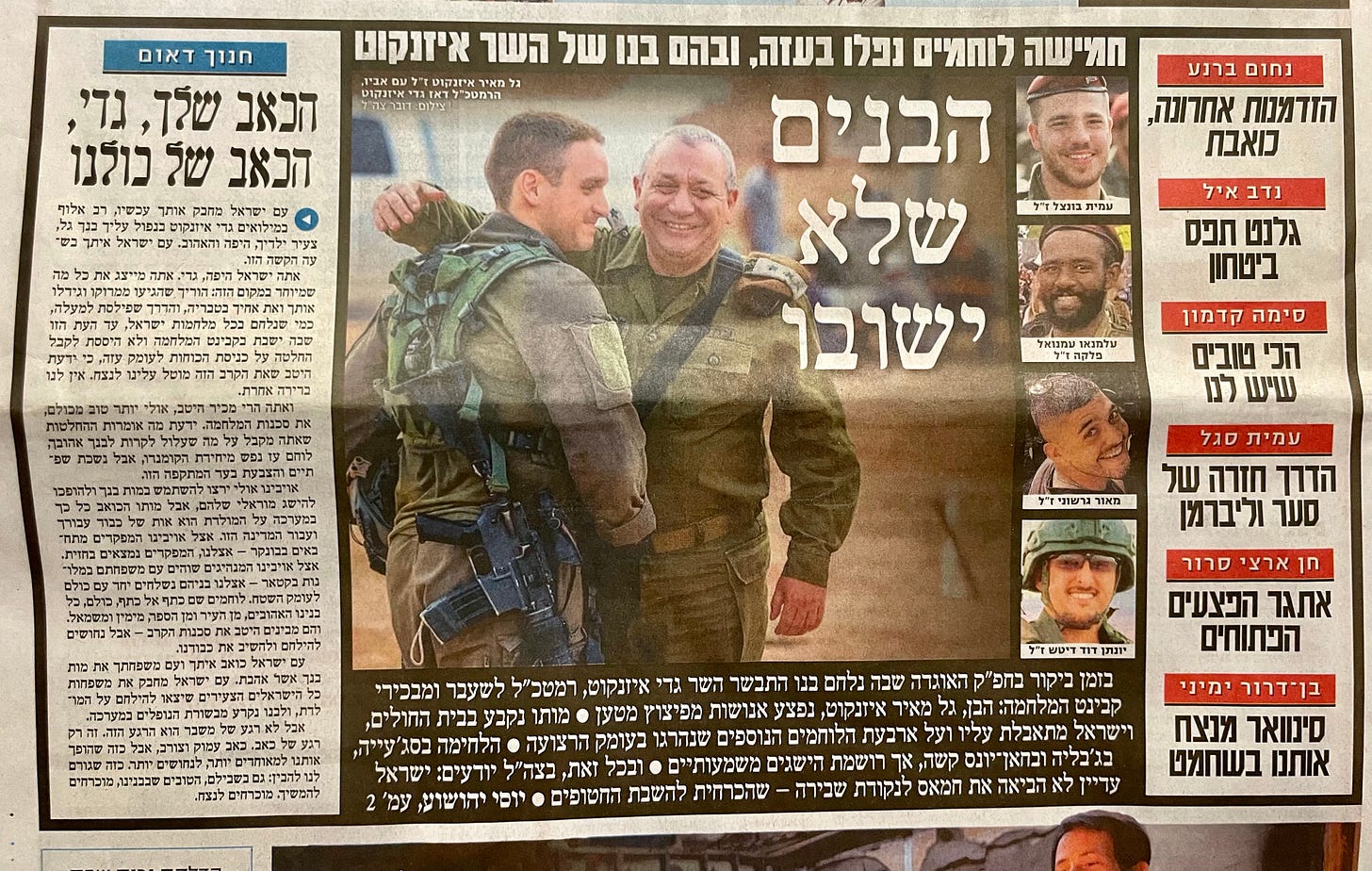
The white headline to the right of the pictures reads, “The sons who will not return.” Those are the faces of other IDF soldiers killed around the time that Gal was killed.
Chanoch Daum’s “letter” to Gadi Eizenkot after Eizenkot buried his son, Gal, killed in battle in Gaza late last week.
The People of Israel embrace you, Lieutenant General (res.) Gadi Eizenkot over the falling of your son, Gal, the youngest of your children, beautiful and loved. The Nation of Israel is with you at this agonizing moment.
You are the “beautiful Israel,” Gadi, you represent everything that is special about this place: your parents who came from Morocco and raised you and your brothers in Tiberias, and the road that you painstakingly paved upwards, as one who fought in all of Israel’s wars, until this very moment when you sat on the War Cabinet and did not hesitate to take the difficult decision to send troops deep into Gaza, for you knew well that this battle, which was forced on us, we are obliged to win. We have no other choice.
And you know well, better than most, the dangers of war. You knew what the decisions you were making might mean for your beloved son, a fiercely brave commando, but you bit your lips and voted in favor of this attack.
Our enemies may well wish to use the death of your son to raise their own morale, but his painful death in the battle over our homeland is a badge of honor for you and this entire nation. Among our enemies, the commanders hide in bunkers; in our ranks, commanders are at the front. Among our enemies, the leaders stay with their families in hotels in Qatar; in our ranks, their sons are sent with everyone else into the field. They fight there shoulder to shoulder, all of them, our beloved sons, from the city and from the village, those of the right and those of the left, and they understand well the dangers of war, but they are determined to win and to restore our honor.
The Nation of Israel shares your pain and that of your family over the death of the son whom you so loved. The Nation of Israel embraces the families of all the young Israelis who went out to fight for our homeland, and our hearts are torn at the news of those who have fallen in this campaign.
Yet this is not a moment of crisis. It is merely a moment of pain. Of deep and burning pain, but of the sort that renders us more united, more determined. One that leads us to understand: for them, as well, for those best among our sons, we absolutely need to continue. We need to win.
NOTE: In a tragic aftermath to Gal Eizenkot’s death, Israelis learned Saturday night that General Eizenkot’s nephew, Gal’s cousin, had also been killed in combat, a day after Gal died.
There is a raging debate inside Israel about letting fuel into the Gaza strip, even for humanitarian purposes. For everyone is aware that Hamas needs fuel to pump air in and out of its tunnels; without fuel, the tunnels will soon be uninhabitable. And, we have seen, despite our best efforts to the contrary, Hamas is taking an appreciable portion of the fuel sent into Gaza away from civilians and using it for its own military purposes. But there’s no choice—the international community has spoken, and if Israel does not let the fuel in, the clock running down on our time to get this operation completed will tick much more quickly.
The cartoon above (shown in the green box below, obviously) reflects that frustration, and adds a Hanukkah twist. It shows Yihyeh Sinwar, the head of Hamas (who was in Israeli prison for twenty years and freed as part of the Shalit deal) watching Israeli TV. The caption at the bottom of the screen, in the red banner, reads “approval has been given for bringing fuel into Gaza.”
Sinwar, himself, says
“Fuel that should only have lasted for one day is going to last for eight. It’s a miracle!”
Now, we turn to two sections of one of the Opinion Pages of Makor Rishon. We begin with only the last paragraph of Ari Shavit’s column, as a sobering reminder of what Israelis know still lies ahead of them. The entire column is worth reading, but this week, we’re focusing on the column that follows, that of Eliaz Cohen, more on which in a moment.
Here’s Shavit, in the small red box at the bottom left:
Ari Shavit—“It’s not over yet.”
We must understand: it is not over yet. It won't end anytime soon either. It is not certain that Israel will achieve a crushing victory in the Gaza Strip. But even if the IDF grants us what is very difficult to grant—the North is still waiting. And Iran is still waiting. A ring of unprecedented threats surrounds us.
When we intuited that we were back in 1948, we understood correctly. [Like then], [w]e have long years of blood, sweat and tears ahead of us.
If we go back to behaving the way we did in the decade that led to the pogrom of 2023, we will not survive the decade after 2023. A new page, Israelis. A new chapter. And above all, a new [governmental] establishment.
Finally, for today, a column by Eliaz Cohen (in the purple outline above), “I’ve also sobered up.” “Sobering up” is a commonly used phrase in Israel since the pogrom. As in, “now do you get it?” It’s used about Hamas. It’s use about not calling other Israelis traitors. It’s used about recognizing the utter ineffectiveness of this government. It’s used in dozens of different ways. But as a whole, it is said, all of Israel is “sobering up.”
Eliaz Cohen is a fascinating writer. His parents were activists in the Gush Emunim (settler) movement, considered far to the right. He continues to live in Kfar Eztion, a “settlement” (though that word is very problematic in this case because of the history of Kfar Eztion, too complex for this moment), which is over the green line. But he’s also known as a leading religious peace activist. A fascinating combination.
Here’s what he had to say this weekend:
Eliaz Cohen—“I’ve also sobered up”
The events of Simchat Torah 5784 are an earthquake and reawakening on a historical-biblical scale. None of us has the right to look at reality the way we looked at it before October 7th.
Prehistory and history; BC and after. That is the depth with which we relate to the event that shook and continues to shake us all. And rightfully so. Tremors and aftershocks plague us in these months, and along with the renewed belief in our sovereignty that arose from the dust, we are all gripped by great uncertainty, anxiety over what seemed protected and obvious, terror over the unknown. Fear for those dearest to us, at home and at the front, with three of my own warriors in this war.
“Well, have you sobered up?” friends in Kfar-Etzion and other circles ask me. And I’m not ashamed to admit that in some very basic things yes, absolutely, I sobered up.
For example, for many years I renounced and opposed and preached against Benjamin Netanyahu’s repeated statements that “we shall live by our sword forever.” In Yitzchak’s “blessing” to Esau, which became our “mantra,” I saw a lack of vision and futility and a denial of hope. I refused to see the simple facts, the ones that Jabotinsky formulated already a hundred years ago in the “Iron Wall”: as long as our surrounding neighbors, and the Arabs of the country in particular, do not accept the depth of our belonging to this land and our return to it, we will be forced to hold a sword and a rifle and an F-35. Generation after generation, we will continue to pass the sword from father to son, as in a relay race, and be ready to go to battle.
For example, the recognition that there are people and organizations and movements that are an enemy, a real enemy. The one who rises up against you, you must kill as soon as you can, for his very existence endangers us.
But no, not all Muslims, not all Arabs, not all Palestinians, and not all residents of Gaza. But those who are members and activists of the Hamas movement, and choose to remain so even after the monstrous massacre of October 7, are not only an enemy; they removed themselves from the family of nations and condemned themselves to death. And they are certainly no longer partners for potential reconciliation. They are not the sort that the monotheistic religious element can bridge and connect, as my rabbi and friend Rabbi Menachem Froman believed they were. There are others, in moderate Islam, in the Sufi and Ahmadi streams, in parts of the Sunnah, who believe in the Abrahamic covenant; in the people of the southern faction of the Islamic movement in Israel. Not Hamas, Hamas is Amalek. And I do not hesitate to say that now.
And for example, as long as we try to hide and beautify the cruel and barbaric elements that, to our grave disappointment, are embedded in too broad parts of both Muslim and Palestinian society, we will not be able to assess or to understand the past, nor the present, and certainly not the future of the two peoples in this country. The elements of bloodthirsty barbaric slaughter, of tearing and dismembering limbs, with hands and destructive tools; of torture and rape and mutilation and humiliation of living bodies and dead bodies; of the lustful and joyous murder of women, old and young, passing like a bloody and screaming second thread from the events of 1929, through the mutilation of the bodies of the heroes of the 20th century and in other events, the Fedayeen attacks, and the Ma'ale-Akrabim massacre, to the lynching in Ramallah, when there were thousands more acts of criminal terrorism against Israelis and Jews in Israel and around the world.
The unimaginable horror events of October 7 are the culmination of barbaric cruelty that is about a century old. And to our horror, they receive support and backing, and in the best case a lack of rejection and non-condemnation from the majority of the Muslim and Palestinian world. And until there is a movement of renunciation and correction and a very deep repentance on their side, we will not be able to establish a common life here on the thresholds of reconciliation and agreement and peace. For many years now, friends have been telling me that until there are no organizations like “Tag Meir” [DG — an Israeli Jewish organization that seeks to counter Jewish terrorism] in Palestinian society, there is no one to make peace with. In the last two months, I’ve finally understood what they are talking about.
But there are also principles to which I am even more committed. The understanding that none of the peoples who consider this country their homeland will leave here. The understanding that we cannot survive by sword alone. That we also have the responsibility to turn over every stone and strive to find a partner there, to reach out the hand (the other hand, the one not holding the sword), as far and as bravely as possible, and to discover that indeed, there is a sister’s hand on the other side. From the experience of the last twenty years, including these very days, I know that there is. And we must make war on evil now so that we can strive for peace later.
“God will give might to His people, [and then] God will bless His people with peace.” [Ps. 49:11]
Next week, I’ll be in New York for two events in conjunction with The Rabbi Lord Jonathan Sacks-Herenstein Center for Values and Leadership of Yeshiva University.
The first event requires registration (via the red button below); the second event is open to the public (there is also a pre-registration button for that event).
On Sunday, December 17, at 8:00 in Cedarhurst:
On Tuesday, December 19, at Weissberg Commons, Yeshiva University campus, Washington Heights:
If you’re just joining us, Israel from the Inside typically posts a written column on Mondays and a podcast on Wednesdays. That is obviously irrelevant for the time being.
We’ve delayed all the podcasts that were ready to go, because the people whose stories they tell deserve to tell them when we all have the bandwidth to hear. Hopefully, that will return some day.
In the interim, we’ll post as possible. Here in Israel, there are non-stop funerals to go to, shiva homes to visit, grandchildren to help care for while sons and daughters are in the army, so we’ll see.
Schedules are the least of our worries.
Impossible Takes Longer is now available on Amazon and Barnes & Noble and at other booksellers.
Our Threads feed is danielgordis. We’ll start to use it more shortly.



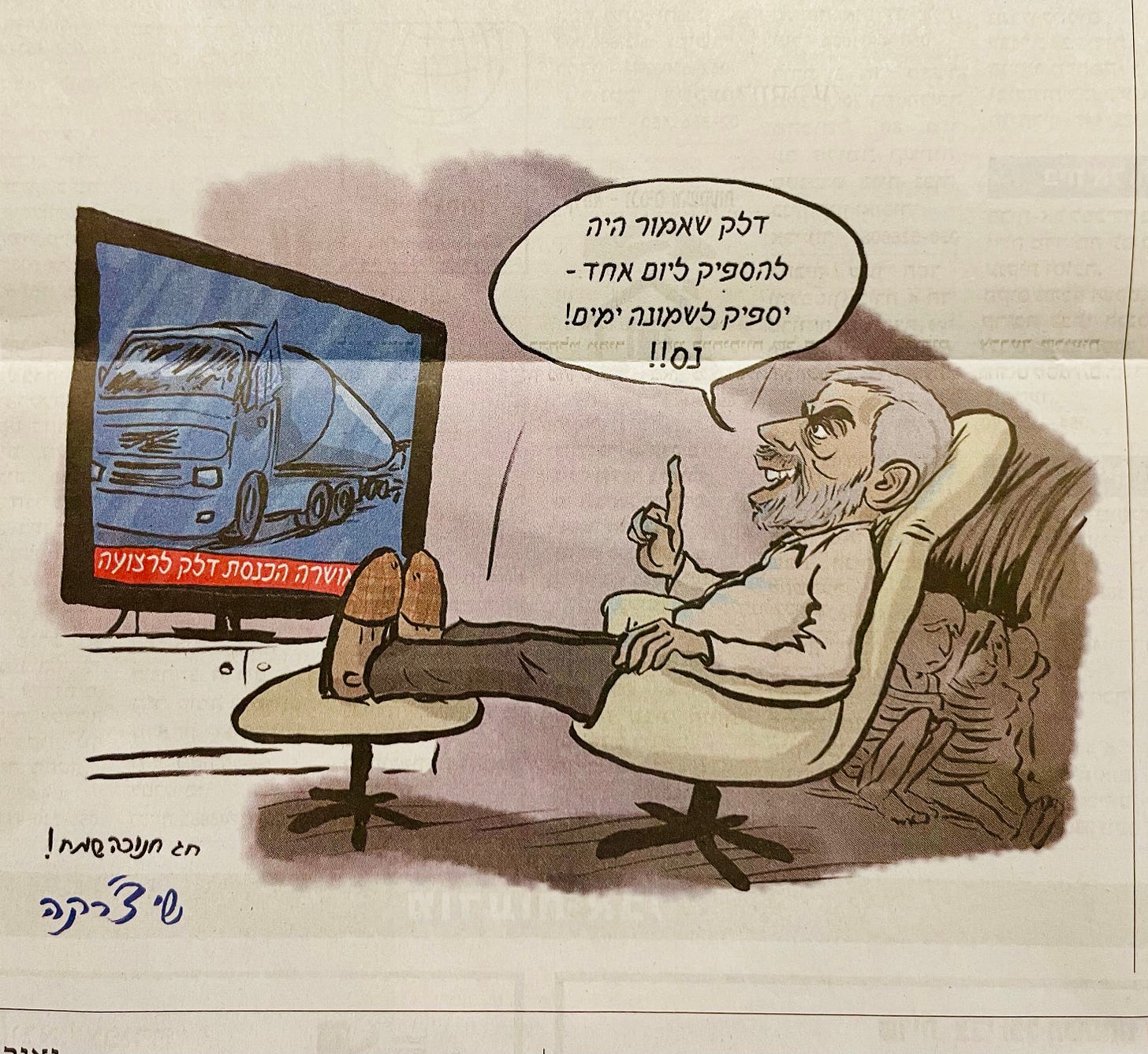
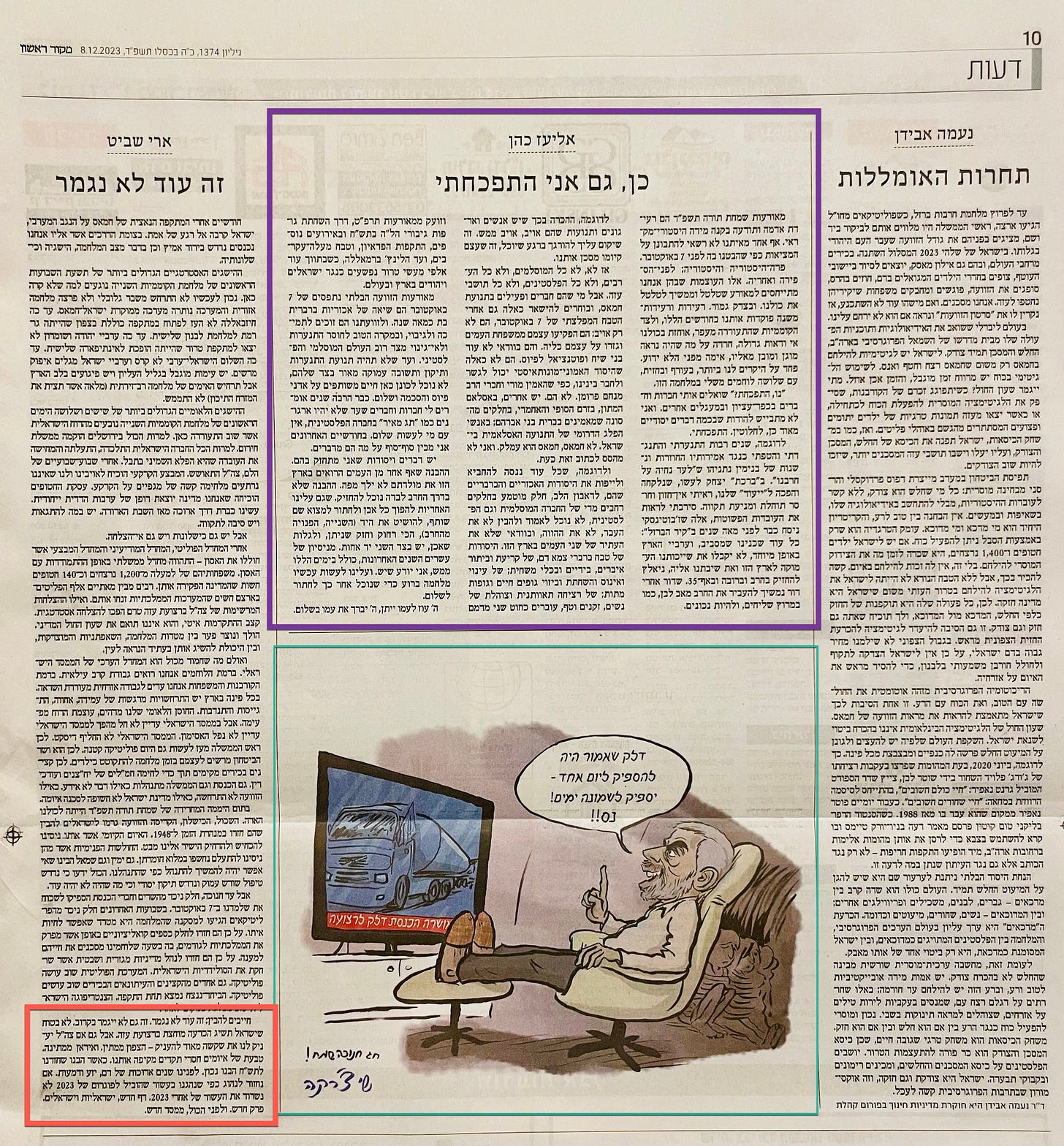


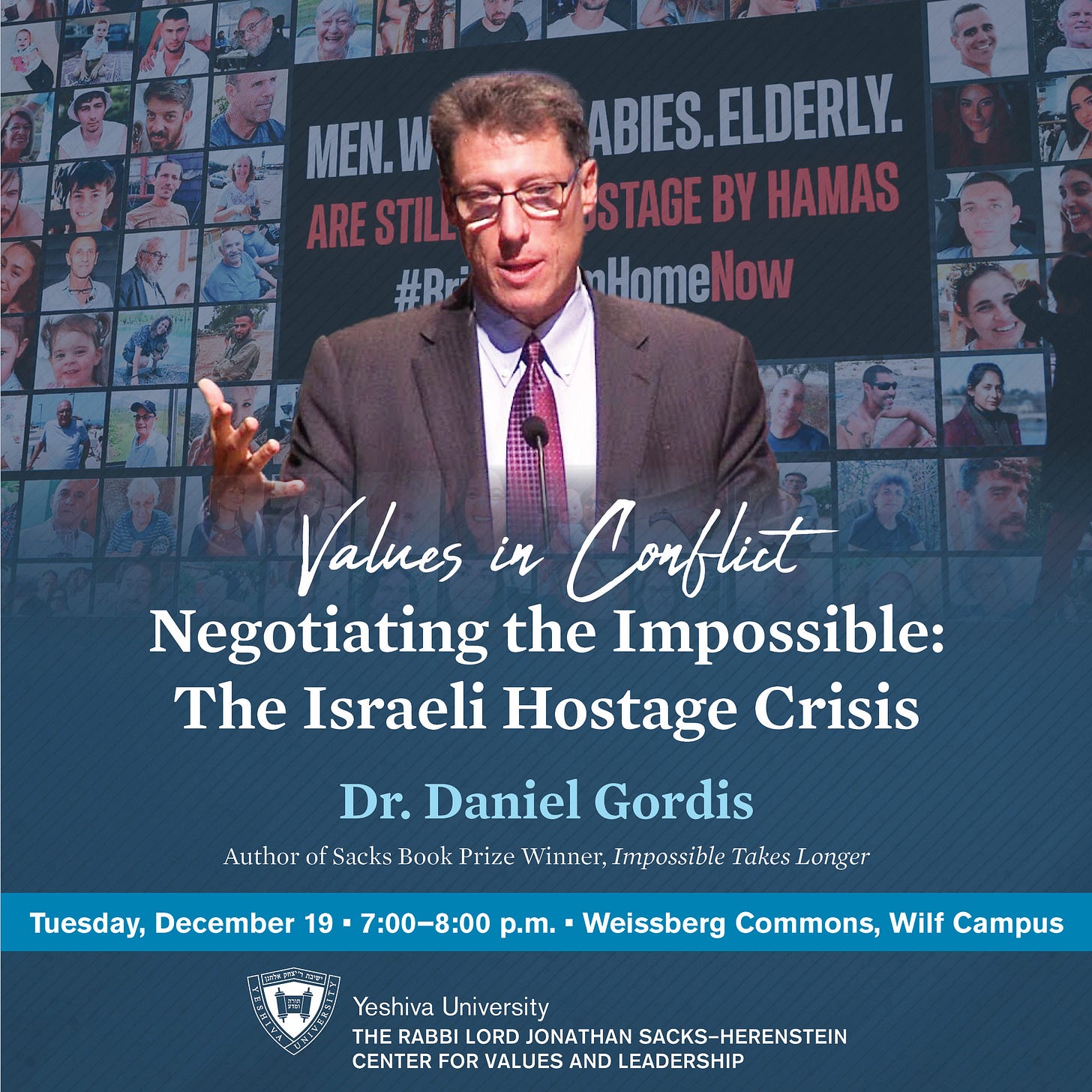



Not to nitpik, but given the role that women have been playing in this war - and one supposes going forward as well - it would be nice to see that acknowledged in the various pieces. Everything is about "our sons." Isn't it past time to also acknowledge the brave "daughters?" Surely a more neutral word could be found by each of the writers.
Is it possible to incentivize gazans to turn in members of Hamas for monetary assistance in rebuilding Gaza?